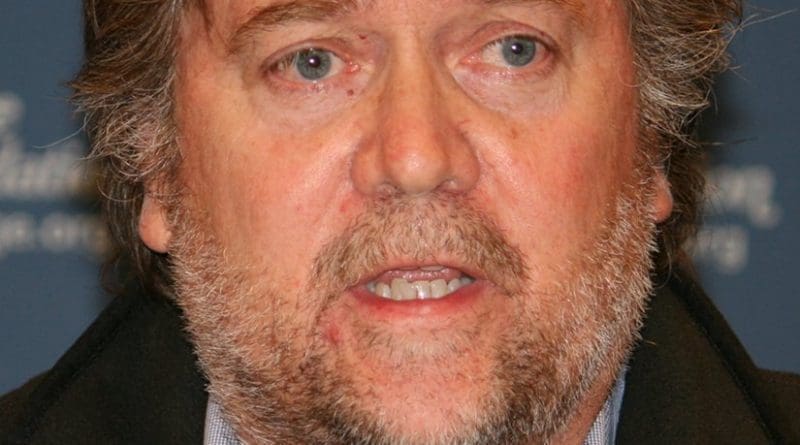Trump/Bannon Fallout Should Not Obscure Need To Confront China – OpEd
The recent explosive fallout between President Trump and his former Chief Strategist, Breitbart CEO Stephen Bannon could lead policy down many different vectors. However, in one area it is critical that President Trump embrace a position similar to that of Mr. Bannon and that is on the imperative of confronting China and doing so now rather than waiting.
To his great credit, President Trump has attempted to close the door to a past era that was opened in 1972 when President Richard Nixon famously went to China. While countless efforts have been made over the intervening decades to facilitate China’s ability to counter the Soviet Union during the Cold War and then, after the Soviet Union’s fall, to become a “responsible stakeholder” in the global system, this has clearly not turned out as China optimists had hoped. Even President Nixon, if not his consigliere Henry Kissinger, questioned our policy towards China prior to his passing in 1994 and wondered if China might not be our Frankenstein.
China is clearly not embracing the liberal internationalist values so near and dear to the fans of globalization. Rather, China is using the opportunities afforded it by globalization to build itself up and to rise once more. It has done so by cheating in foreign trade deals, stealing billions of American companies’ intellectual property rights, monomaniacally focusing on building a top tier military, and perfecting what might turn out to be the world’s most sophisticated police state.
Why all of this? As the Chinese aphorism says, “When two emperors appear simultaneously, one must be destroyed.” This represents something like the rejuvenation of the old concept of “tianxi” which sees China as the central political entity in Asia with other nations seen as “civilized” to the degree they functionally act as tributaries. It has clearly made a comeback in China, though it questionable if it ever really left (see Howard French’s excellent Everything Under the Heavens).
Dealing with this multifaceted challenge is the geopolitical story of the 21st Century. Whether it is Graham Allison’s Thucydides Trap or Michael Pillsbury’s 100 Year Marathon or Aaron Friedberg’s Contest for Supremacy, leading policymakers and scholars have been slowly coming around to this view. It is now time that American leaders at all levels of government, and outside of only the Pentagon, should stop harboring illusions that a grand competition against China is avoidable. The real question is how that competition will look and develop over the years and decades ahead.
Stephen Bannon has echoed many of these points in recent years and, especially, in recent months. He is right to do so. Unfortunately, there is a real risk that the recent contretemps over a new book may distract as well reinforce status quo policy.
This is a time for deep thinking about American power and American strategy to come to grips with a China that is a far different, more complex, and ultimately likely more powerful competitor than the Soviet Union. This author has argued for a grand strategy focusing on China called the “Iron Quadrilateral” that focuses on:
- Tilting back to Russia rather than facilitating the consolidation of a Sino-Russian axis is Eurasia;
- Greatly reducing our presence in the Middle East and embracing a “Richelieu” like strategy for the region;
- Reinforcing our alliance with Japan
- Fully embracing India’s rise.
Thus far, again to the President’s great credit, the U.S. is moving forward on the second two elements of this strategy. However, due to political rancor over Russia and the 2016 Election and an inability to quit engaging deeply in the Sands of Mesopotamia, the first two are not being embraced. This risks distraction at a key moment in our burgeoning geopolitical contest with China.
Exacerbating that risk is the controversy over the soon to be published “tell all” book seems to have driven a wedge between Trump and Bannon, perhaps even a fatal one. The media and Washington D.C. insiders are breathlessly wondering what this means for Trump’s relationship with his base. In the absence of Bannon’s influence, will Trump embrace the more status quo positions of many in his New York orbit, or will he still tilt to the base that elected him? There is no doubt that these are interesting parlor games, but they should not lead to a loss of focus on the most critical geopolitical issue of our time.
The United States is at an inflection point. President Trump has done more to move policy in the right direction on China than any President since the opening. However, getting China policy right transcends any single President or advisor. Despite the right initial steps, there are now real risks that further needed policies will become stymied and sink into the D.C. swamp. For America’s future, that must not happen.
*Greg R. Lawson is a contributing analyst at the web-based geopolitical consultancy,Wikistrat. These views are his own.

